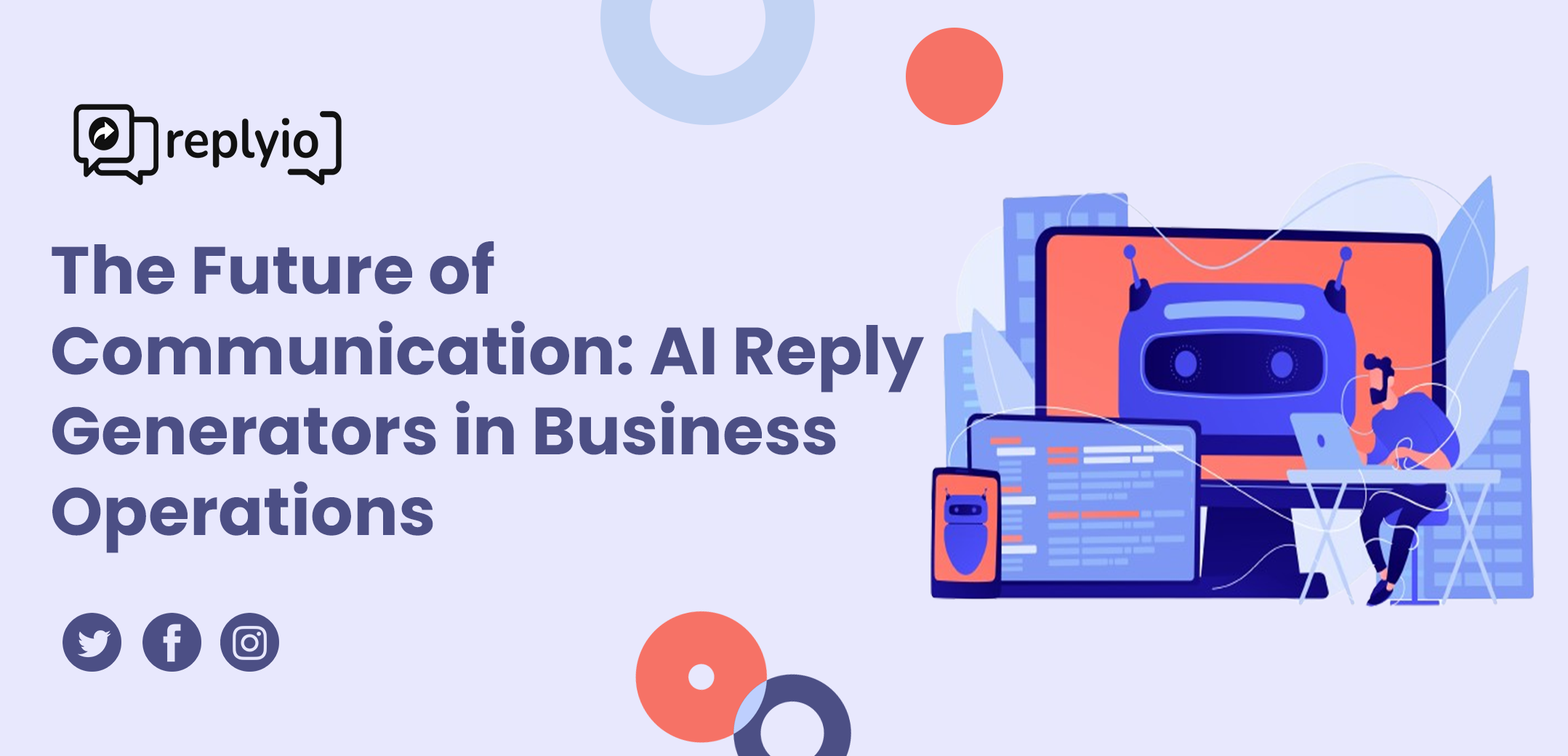Replyio
The Future of Communication: AI Reply Generators in Business Operations
-
Jul 25, 2024
-
8 min read

In the rapidly evolving digital landscape, businesses are constantly seeking ways to optimize communication. One of the most exciting developments in this realm is the rise of AI reply generators. From automating customer service responses to streamlining internal communications, AI-powered tools are reshaping how organizations interact both externally and internally. But what exactly is an AI reply generator, and why is it so crucial to the future of business operations?
What Are AI Reply Generators?
AI reply generators are tools powered by machine learning models, like GPT (Generative Pre-trained Transformers), that can analyze the context of a conversation and generate appropriate responses. These systems can create human-like replies based on the data they’ve been trained on, allowing businesses to respond quickly and efficiently to various forms of communication. From emails to customer service chats, AI reply generators are reducing the time spent on repetitive tasks.
Streamlining Customer Support
One of the primary areas where AI reply generators have shown immense promise is customer service. Many businesses struggle to keep up with the volume of customer inquiries, often leading to delayed responses or missed opportunities. AI-powered reply systems can instantly craft responses to common questions, providing near-instant feedback to customers. This has several benefits:
1. Increased Efficiency:
AI can handle a large volume of queries simultaneously, freeing up human agents to focus on more complex issues.
2. 24/7 Availability:
Businesses no longer need to worry about time zones or business hours. AI is always on, ensuring customers receive timely responses, no matter the time of day.
3. Consistency in Communication:
AI ensures that every reply aligns with the company’s tone, branding, and communication standards, reducing the chances of human error.
Enhancing Internal Communication
Beyond customer service, AI reply generators can also improve internal communications. For example, when team members need quick answers or status updates, AI tools can provide instant replies based on stored data, saving time and improving productivity. Additionally, AI-powered systems can be used to draft emails, set reminders, or offer suggestions for meeting follow-ups, automating much of the day-to-day administrative workload.
AI Personalization: The Next Step
While early AI reply generators focused on creating generic responses, the next wave of AI communication tools is all about personalization. AI can now craft replies that are tailored to the recipient’s preferences, previous interactions, and even emotional tone. This is particularly useful for sales and marketing teams, where building a personal connection can make all the difference.
Imagine receiving a customer support email where the AI not only addresses your concern but also acknowledges your previous interactions with the company, suggesting tailored solutions based on your past behavior. This level of personalization builds trust and can significantly enhance the customer experience.
Addressing the Concerns: Are AI Replies Too Robotic?
One of the common concerns about AI reply generators is that they might sound too robotic or impersonal. However, as natural language processing (NLP) technology improves, AI-generated replies are becoming more and more indistinguishable from human responses. Modern AI tools are capable of understanding context, tone, and even humor, allowing them to create replies that feel genuinely human.
Moreover, businesses can fine-tune these systems to align with their unique voice. Whether you want a professional, formal tone or a more relaxed, conversational style, AI systems can be trained to match your brand’s personality.
Challenges and Ethical Considerations
Despite the many benefits, there are still challenges that come with the use of AI reply generators. One of the key concerns is the loss of the human touch in customer interactions. While AI can handle routine queries, some issues require empathy and a level of understanding that AI currently can’t replicate.
Additionally, ethical concerns about data privacy and security are paramount. AI systems rely on large amounts of data to function effectively, and businesses need to ensure that sensitive information is protected.
The Future: AI Reply Generators as Essential Business Tools
The future of AI reply generators is bright. As AI continues to evolve, these systems will become even more integral to business operations. We can expect to see advancements in sentiment analysis, which will allow AI tools to better understand the emotional context of a message and respond accordingly. Additionally, integration with other AI tools, like voice assistants or CRM systems, will further enhance the capabilities of reply generators.
AI reply generators are transforming the landscape of sales and marketing outreach by providing faster, more personalized, and consistent communication. By leveraging these advanced tools, businesses can improve engagement, streamline processes, and maintain a strong brand presence. As technology continues to advance, embracing AI-driven solutions will be crucial for staying competitive and delivering exceptional customer experiences.
Ultimately, businesses that embrace AI reply generators will find themselves better positioned to navigate the complexities of modern communication. By streamlining processes, enhancing customer experience, and improving internal efficiency, these tools are set to play a pivotal role in the future of business operations.
AI reply generators are not just a trend—they're becoming a core component of business communication strategies. As technology continues to evolve, these systems will only become more sophisticated, helping companies stay competitive in a fast-paced world. Whether it’s providing instant customer support or managing internal communications, AI is shaping the future of how businesses connect and collaborate.

